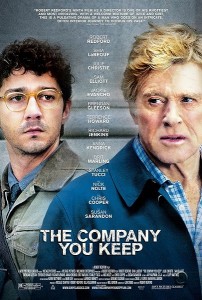The Company You Keep
Posted on April 11, 2013 at 6:13 pm
 I can’t help thinking that even though this movie is based on a novel by Neil Gordon
I can’t help thinking that even though this movie is based on a novel by Neil Gordon, it is primarily a trip down memory lane for director/star Robert Redford. Shia LeBeouf plays Ben, an idealistic investigative reporter a la Redford in “All the President’s Men.” Redford himself plays a “Three Days of the Condor”-style guy on the run from the government and the aging radical living under another name from “Sneakers.” There are the buried family tensions of his first filmas a director, “Ordinary People.” And let’s not forget — no matter how much we try — the long debates about philosophy and policy in his last directing/starring movie, Lions for Lambs, For a moment, I thought he was going to jump off a cliff a la “Butch Cassidy and the Sundance Kid.”
There’s nothing wrong in wrestling with the same themes, especially themes as meaty as the conflicts between our larger responsibilities as citizens and our responsibilities as family members and friends and when the ends justify the means — or when the means just make you into the same kind of bad guy as the people you are fighting.
Redford plays a single dad and small town lawyer who, it turns out, has been living under an assumed name for longer than he lived under his own. When a suburban mother of two teenagers (Susan Sarandon) turns out to be a long-missing fugitive sought by the FBI for her role in a bank robbery that led to the felony murder of a guard (himself a father of two children). The robbery was the last act of a splinter group from the anti-war Weather Underground. (Apparently, this fictional theft was inspired by the 1981 Brinks robbery by members of the Weather Underground and Black Panthers.)
Ben, a reporter at a failing newspaper called the Albany Sun-Times, does some research and discovers that the man known as Jim Kent (Redford) is really Nick Sloan, also a fugitive accused of participating in the robbery. Jim/Nick leaves his 11-year-old daughter (singing sensation Jackie Evancho, sweetly natural) with his brother (Chris Cooper), and goes on the run, contacting the old gang (including Nick Nolte, Richard Jenkins, and Julie Christie), none of whom are very happy to see him.
Meanwhile, both the FBI (Terrance Howard and Anna Kendrick) and the reporter are chasing after Jim/Nick with all kinds of high-tech surveillance (FBI) and looking at old microfilms for the kinds of esoteric newspaper archives and property records that are not even online (reporter).
There is some talk about protest here, with a pause for a professor’s lecture to his class about determination to make absolutely sure we do not miss the point. And there is more talk about parents and children and how they change the calculus of responsibility and a great big metaphor of a character who is supposed to represent all of that.
Like “Lions for Lambs,” this is a talky film, but the balance this time is more on the side of story, and the non-stop parade of top-tier actors hold our interest. The title is as much about our relationship as long-term fans of these masterful performers as it is about the characters who have been hiding out as they come to grips with their failures and betrayals.
Parents should know that there are glimpses of wartime and protest violence and characters use strong language. The movie includes drinking and drug dealing.
Family discussion: How did having children make people evaluate their options differently? Do you agree with Ben’s decision at the end? How did the characters show their different ideas of loyalty?
If you like this, try: “Running on Empty” and “Steal This Movie”
